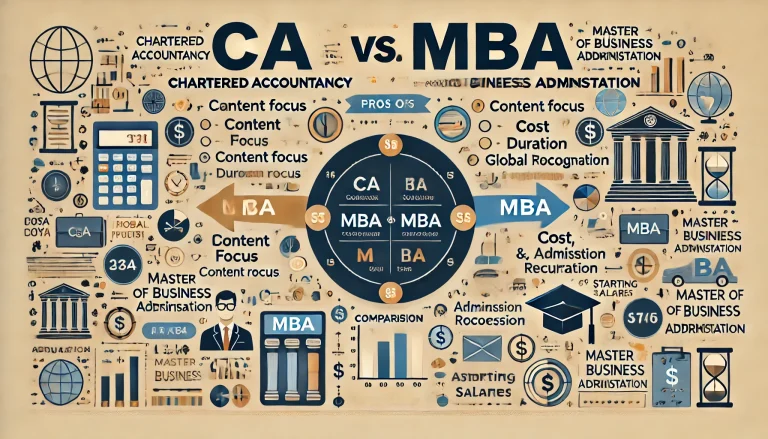When considering a career in the finance or business sector, two popular paths often come to mind: the Chartered Accountancy (CA) qualification and the Master of Business Administration (MBA) degree. Both CA vs MBA can lead to rewarding careers, but choosing the right one depends on your aspirations, skills, and long-term goals. In this blog post, we will explore the differences, career opportunities, and key factors between CA vs MBA, helping you make an informed decision.
Understanding CA: A Deep Dive into Chartered Accountancy
The Chartered Accountancy (CA) qualification is one of the most prestigious certifications in the finance sector, particularly in India. The CA designation provides a deep understanding of accounting, auditing, taxation, and financial management, offering a solid foundation for those looking to excel in finance.
To become a CA, students must clear a series of three rigorous levels of exams—Foundation, Intermediate, and Final—administered by the Institute of Chartered Accountants of India (ICAI). The pass rate for each level typically ranges between 5-10%, making it a challenging journey that requires dedication and perseverance.
The process includes three years of articles, where students gain practical, hands-on experience by working under a practicing CA. This combination of academic rigor and practical experience is why CAs are highly valued in the finance industry.
Starting Salaries for CAs
- Big 4 Firms: Chartered Accountants employed by the Big 4 accounting firms (Deloitte, PwC, KPMG, EY) can expect a starting salary between ₹6-9 lakhs per annum.
- Other Firms and Corporates: On average, CAs start with salaries ranging from ₹4-6 lakhs per annum. The starting salary largely depends on the firm and individual performance.
Challenges of CA
- Pass Rate: With a pass rate of less than 10%, the CA course is one of the most difficult qualifications in India. Approximately 60% of students drop out before completing the qualification.
- Time Commitment: On average, it takes 4-5 years to complete all levels of CA. For many students, the duration can be even longer if they do not clear the exams on the first attempt.
- Limited Global Scope: Unlike other finance qualifications, CA from ICAI has limited international recognition. For global career prospects, CAs may need additional certifications, such as CPA or ACCA.
Exploring the MBA Degree: A Comprehensive Overview
An MBA (Master of Business Administration) is a postgraduate degree designed to provide a broad overview of business management. An MBA program covers a variety of disciplines, such as finance, marketing, operations, human resources, and strategy.
MBA programs are often geared towards those aspiring to take on leadership roles. The curriculum emphasizes strategic decision-making, leadership, and critical thinking. Students participate in case studies, group projects, and internships, which simulate real-world business challenges, making the learning experience practical.
One of the most valuable aspects of an MBA is the networking opportunities it provides. Students build connections with industry experts, alumni, and faculty, creating a professional network that often becomes essential for career growth. Additionally, MBA programs offer specializations in areas such as finance, entrepreneurship, international business, and more, allowing students to tailor their learning to their specific career goals.
Starting Salaries for MBA Graduates
- Top Institutes: Graduates from premier institutions like IIMs, ISB, or XLRI have starting salaries ranging from ₹12-25 lakhs per annum.
- Tier 2 Institutes: For MBA graduates from Tier 2 institutes, the starting salaries generally range from ₹4-8 lakhs per annum, highlighting the disparity in ROI between different MBA programs.
Challenges of MBA
- High Cost: Pursuing an MBA is a significant investment. The average fees for an MBA at a Tier 1 institute in India range between ₹15-30 lakhs, and it can be ₹60 lakhs or more for international MBA programs.
- Variable ROI: The return on investment (ROI) for an MBA largely depends on the institute’s prestige. Graduates from top-tier institutes have lucrative opportunities, while those from lesser-known institutes may struggle to justify the financial investment.
- Competitive Admission: Admission into an MBA program is competitive, requiring high scores in entrance exams like CAT, GMAT, or XAT. In 2023, over 2.3 lakh students appeared for CAT, while only about 2,000 managed to secure admission in Tier 1 institutions.

Key Differences Between CA vs MBA
The CA vs MBA paths cater to different career goals, strengths, and professional environments. Here’s a clear comparison to help you decide:
| Aspect | CA | MBA |
|---|---|---|
| Content Focus | Accounting, Auditing, Taxation, Finance | Business Strategy, Leadership, Marketing |
| Duration | 4-5 years | 1-2 years (varies based on program type) |
| Cost | ₹1-1.5 lakhs | ₹15-30 lakhs (India) |
| Admission | Direct entry after 12th; Foundation Level | Bachelor’s degree + entrance exams (CAT/GMAT) |
| Flexibility | Self-paced; study while working | Fixed schedule (full-time, part-time, or EMBA) |
| Pass Rate | Less than 10% | Competitive admission process |
| Global Scope | Limited recognition outside India | Broader international recognition |
These differences underscore how CA is highly specialized and focuses on building deep expertise in finance and accounting, while MBA is broader and prepares students for leadership and management roles across industries.
Career Opportunities: CA vs MBA
Career Opportunities for CA Graduates
Chartered Accountants are highly valued for their expertise in accounting and finance. Here are some typical career paths for CAs:
- Audit Firms: Roles such as Auditor or Tax Consultant in firms like KPMG, Deloitte, etc.
- Corporate Finance: Positions like Finance Manager, Financial Analyst, or even Chief Financial Officer (CFO).
- Own Practice: Many CAs opt for independent practice, providing tax, audit, and financial advisory services.
- The starting salary for CAs is typically between ₹4-6 lakhs per annum, with Big 4 firms offering more competitive packages ranging up to ₹9 lakhs.
Career Opportunities for MBA Graduates
MBA graduates typically pursue careers across a diverse range of industries:
- Consulting and Management: Positions in consulting firms such as McKinsey or BCG; roles include Management Consultant or Project Manager.
- Corporate Roles: Roles such as Product Manager, Operations Manager, or CEO, often focusing on business strategy and leadership.
- Entrepreneurship: Many MBA graduates venture into their own businesses, using their understanding of different aspects of running a company.
Graduates from top-tier MBA programs earn starting salaries of ₹12-25 lakhs per annum, while those from Tier 2 institutes often start at ₹4-8 lakhs per annum.
Is CA Better Than MBA?
The answer to whether CA is better than MBA depends on your career goals and aspirations.
- CA is perfect for those who want a specialized career in accounting, finance, or auditing. It’s cost-effective and leads to high-responsibility roles within corporate finance, auditing, and taxation. However, it requires immense discipline, as the pass rates are low, and the journey is long and challenging.
- MBA, on the other hand, is ideal for those aiming for diverse business opportunities and leadership positions. It provides a broad skillset that makes you adaptable across various industries. However, it requires a significant financial investment and comes with variable returns depending on the institute’s prestige.
Which Is Right for You? Factors to Consider
Choosing between CA and MBA hinges on several key factors:
Choose CA If:
- You are interested in accounting, taxation, and auditing.
- You want a cost-effective qualification with high respect in the finance sector.
- You are prepared for a rigorous and challenging exam process with a low pass rate.
- You value flexibility and want to study at your own pace while gaining practical experience.
Choose MBA If:
- You want a broader business education that includes marketing, operations, and strategy.
- You aspire to hold leadership positions or manage teams across different industries.
- You are willing to invest a substantial amount of money and are confident about the ROI from a top-tier institution.
- You value networking and want to build a strong professional network.
The decision between CA vs MBA should align with your career aspirations, financial capabilities, and long-term goals. Both options offer valuable career opportunities but cater to different professional pathways.
Starting Salary Comparison:
- CA: Starting salaries range from ₹4-6 lakhs per annum.
- MBA: From Tier 1 institutes, salaries range from ₹12-25 lakhs per annum, while Tier 2 graduates start at ₹4-8 lakhs.
Both CA and MBA have the potential to shape your career significantly, but it’s essential to evaluate which path fits better with your career aspirations.
What Comes Next? Stay Tuned for Alternatives!
While CA and MBA are well-established career paths, are they really the best fit for today’s rapidly evolving business landscape? With the world changing at a fast pace, it may be time to consider some modern alternatives that are more aligned with current industry demands.
Stay tuned for tomorrow’s post where we will explore some exciting new career options that can help you stay ahead of the curve and thrive in today’s professional world! 🚀
MBA vs CA FAQs
Which is better, CA or MBA?
Career aspirations determine whether one should opt for an MBA or a CA qualification. CAs focus on compliance and financial accounting, making them suitable for positions in corporate finance and accounting firms. Unlike that, an MBA imparts more management and leadership skills across various sectors of the economy
Can I join MBA after CA?
A candidate who is either a graduate from a recognized University or has passed the Final stage of the Chartered Accountancy Course of ICAI or on completing the BBA / B.Com degree through ICAI (by whatever name called) shall be eligible for admission to the M.B.A. Course.
Is it ok to do CA after MBA?
You have done MBA and now working in bank which might be a total finance field, and CA will give you knowledge of and speciality of accounting and audit and tax, not gonna upskill your profile for the bank Or even if you want to go for financial job .
Is MBA harder than CA?
A Chartered Accountancy (CA) is way tougher than an MBA course. A Master of Business Administration (MBA) is not that tough as compared to a CA. While pursuing CA, students have to study subjects like financial accounting, business environment, auditing, reporting, general management, taxation, etc.


